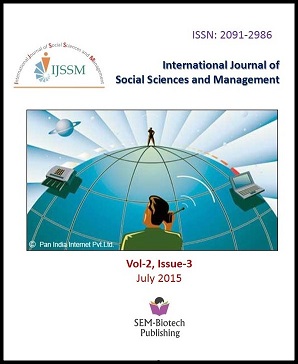Association of Women Empowerment with Inter-Spousal Communication on RCH Matters In Selected South Asian Countries
DOI:
https://doi.org/10.3126/ijssm.v2i3.12477Keywords:
Women Empowerment Index (WEI), Low (L), Medium (M), High (H), Principle Component Analysis (PCA), Multilevel Logistic Regression (MLR), Information, Education and Communication (IEC), Reproductive and Child Health (RCH)Abstract
Women have commonly less power, chance and empowerment to interfere in making decision about RCH matters between men in most parts of South Asia. It is related to her education, ethnicity, deprivation level, urban/rural classification. This study based on this issue that, does level of woman empowerment affect Inter-spousal communication on RCH matters in the context of India, Nepal and Bangladesh. So, study tries to understand the role of women empowerment on spousal communication about RCH matters with a specified hypothesis. For analysis purpose the Demographic and Health Survey-2006-07 data on currently married women of age 15-49 years has used. Principal Component Analysis (PCA) method used to generate an empowerment index (WEI) to see the effect of empowerment on inter-spousal communication with controlling the selected socio-economic and demographic factors. Bi-variate and tri-varite model findings shows that large proportion of women have low socio-economic and demographic status like age, residence, wealth, religion, education and media exposure and falls with low tertile group of empowerment. The proportion of women is increasing with increasing the level of empowerment for communication related to RCH matter between spouses. Multilevel logistic model found that approximately in range 5 to 8 percent in India, 5 to 7 percent in Nepal and 5 to 6 percent in Bangladesh of the residual variance in spousal communication with and without empowerment for decision making attributable to differences between regions. There is need improvement in socio-economic and demographic factors but India is in good position than Nepal, and Nepal is in good position than Bangladesh in empowerment. In Spousal communication on RCH matter women’s empowerment positively associated in all countries.
Int. J. Soc. Sci. Manage. Vol-2, issue-3: 197-213
DOI: http://dx.doi.org/10.3126/ijssm.v2i3.12477
Downloads
Downloads
Published
How to Cite
Issue
Section
License
This license enables reusers to distribute, remix, adapt, and build upon the material in any medium or format for noncommercial purposes only, and only so long as attribution is given to the creator.




